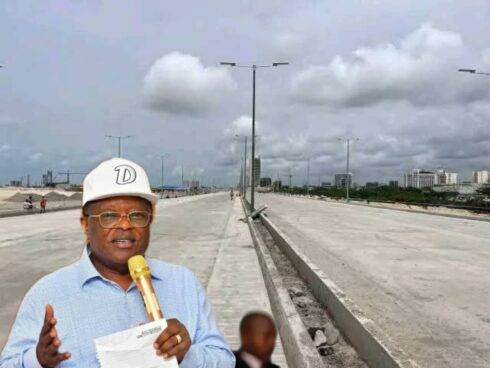The Minister of Works, Dave Umahi, has assured Nigerians that a significant portion of the ambitious Lagos-Calabar Coastal Highway will be ready for commissioning by May 25, 2025. During an appearance on Channels Television’s Politics Today on Friday, Minister Umahi disclosed that 30 kilometres of the road project, from the starting point at Victoria Island to a section near Lekki Seaport in Eleko, will be completed in time for President Bola Ahmed Tinubu to inaugurate.
The Minister Dave Umahi, visibly pleased with the pace and quality of construction, commended the contractors handling the job. “The beginning of section one, as at today, about 15 kilometres by two carriageways on the average has been achieved,” he said. Minister Umahi added that while approximately 17 kilometres would be bypassed due to existing settlements, the continuous stretch to be completed will still span 30 kilometres.
Expressing satisfaction with the quality of work, Minister Umahi jokingly likened the smoothness of the constructed road to the “streets of heaven,” a comment which underscored his optimism about the transformative potential of the project for Nigeria’s infrastructure.
Immediate Tolling Proposed for Completed Segment
In a bid to ensure sustainability and recoup government investment, the Minister Dave Umahi also revealed plans to recommend immediate tolling on the completed section of the highway. Umahi emphasized that the Lagos-Calabar Coastal Highway is not just a legacy project but a long-term economic investment under President Tinubu’s administration.
“The President is no longer looking for legacy things. He’s more about economic investments with meaningful returns,” Umahi said. He argued that the project is financially sound and will generate significant economic benefits, including job creation and improved connectivity along Nigeria’s coastal corridor.
According to the Minister Dave Umahi, once section one is completed before the end of 2025, mechanisms for toll collection will be implemented to begin realizing returns. He assured that the revenue generated will support further development and maintenance of the highway, while also reducing reliance on budgetary allocations.
Minister Dave Umahi Addressing Transparency Concerns in Award Process
Despite criticisms from opposition leaders and former President Olusegun Obasanjo, Minister Umahi insisted that the Lagos-Calabar project has been handled with the highest level of transparency. Prominent voices such as 2023 presidential candidates Atiku Abubakar of the Peoples Democratic Party and Peter Obi of the Labour Party have questioned the procurement process, suggesting that the N15.6 trillion contract lacked proper due process.
Obasanjo, in his latest book Nigeria: Past and Future, called the highway “wasteful,” igniting further public debate. However, Minister Umahi stood firm, saying, “President Bola Ahmed Tinubu never recommended any contractor to me, never sent any contractor to me, never interfered in terms of the costing.”
Minister Dave Umahi noted that former President Obasanjo previously commended his transparency while serving as governor of Ebonyi State. “He can’t now claim I’ve changed,” the Minister Umahi said, defending both his integrity and the administration’s intentions.
Economic and Strategic Importance of the Coastal Highway
Beyond politics, the Lagos-Calabar Coastal Highway is projected to become a game-changer for Nigeria’s economic landscape. The 700-kilometre road, upon full completion, will stretch from Lagos in the southwest to Calabar in the south-south region, facilitating trade, tourism, and connectivity across key economic zones.
The highway is expected to serve as a crucial infrastructure backbone supporting seaports, industrial parks, and urban centres along Nigeria’s coastline. According to Minister Umahi, the project is designed to spur real estate development, ease logistics challenges, and enhance access to emerging oil and gas hubs.
Experts believe that the highway could attract local and foreign investment, as improved infrastructure is essential for economic diversification and regional integration. Minister Dave Umahi also hinted that the government is actively considering public-private partnerships to fast-track the project’s completion.
Public Reactions and Political Implications
Public opinion remains divided on the coastal highway, with many Nigerians applauding the vision while others remain skeptical over funding, displacement concerns, and prioritization. While critics highlight the project’s enormous cost and potential environmental impact, supporters argue that bold infrastructural undertakings are necessary for national development.
The road’s progress will also serve as a political barometer for the Tinubu administration, especially as Nigeria prepares for future electoral cycles. A successful milestone like the May 2025 commissioning could help solidify the administration’s image as pro-development, despite the broader economic and social challenges the country faces.
As May 2025 approaches, all eyes will be on the Ministry of Works and its contractors to meet the ambitious delivery timeline and silence skeptics with visible progress on one of Nigeria’s most talked-about infrastructure projects.
Table of Contents
Discover more from OGM News NG
Subscribe to get the latest posts sent to your email.














